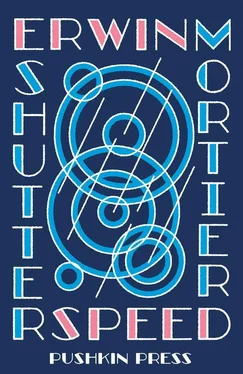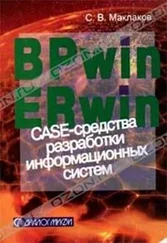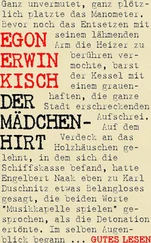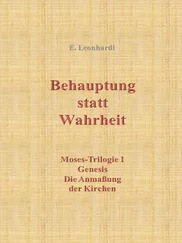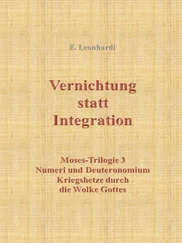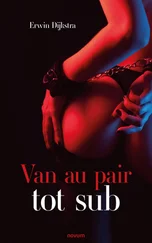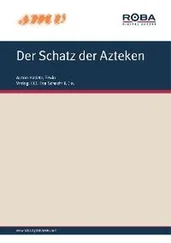‘You’ll be late for the Last Judgment at this rate. And what’ll you do then, eh?’ he sneered. ‘Hang around in space? Or put your hand up and moan: Oh sir, wait sir, I’m not ready yet, sir!’
The ensuing jeers and sniggers moved me to retreat into more or less wounded silence, and to fix my gaze on the dark green dust coat which he donned morning and afternoon as if it were his robe of office.
Back in the days when my father and Uncle Werner were his pupils, his hair had been dark and wavy and his paunch nowhere near sagging.
The annual school photo was not taken in the playground then, but indoors, with all the boys at their desks and the master standing right at the back of the classroom, ramrod-stiff in the space between the stove and the row my father was in. He sat near the window, shoulders hunched and arms folded, as if none of it had anything to do with him.
Perhaps it took longer then to adjust the camera, a redoubtable contraption that reminded me of a cannon, what with the blinding flash and the loud crack as it fired into the air to startle my father. He is not sitting bolt upright but inclining his frame slightly, away from the master and towards the window. On the ledge close to his elbow the potted geraniums crane towards the glass, making all their veins show up against the chill spring light.
Some of the maps hanging on the wall above the cupboards are familiar. Perhaps, in the bleakness of morning lessons, he stared as long and hard as I did at the continents, so that their shapes would perform a shadow dance across the retina when we shut our eyes tight. Perhaps he was just as relieved as I was to come down to earth when the master rummaged in those same cupboards to prepare the next initiation of his boys into the secrets of the Natural World.
On days of particularly gruelling sums, when our toil was deemed worthy of reward, the master went over to the cupboard at the back of the classroom and brought out the model of the solar system. He set it up on his desk and called us all to come forward, and once we were crowding round he would, as often as not, take a deep breath and blow the dust off Saturn’s rings into our faces before making the moon turn around the earth in front of our astonished eyes, and the earth around the sun along with all the planets.
‘In the heavens above,’ he intoned, ‘everything runs like clockwork.’
If we were good we were allowed to take turns at the handle, making the time-warped copper filaments vibrate as they moved the heavenly bodies in circles around an old light bulb, accelerating the years to mere seconds.
It was not until I turned the handle the wrong way, less accidentally than I made out, thereby bringing the entire mechanism to a halt, that the master lost his patience. ‘Ah, you again. I might have known.’
He had all the answers, but that didn’t mean I always took him at his word. Later that day, when he filled a kettle with water before our eyes and put it on a burner until the spout emitted a ribbon of steam, thus proving to his boys that of all matter it was only the form that changed, I did not believe him.
Where did that leave the gestures I made when shifting in my seat, stretching out in my chair, crossing my ankles, or spreading my arms and splaying my fingers on my desk?
When the master let the steam condense against a sheet of glass and caught the drops of moisture in a cup, the sunlight seemed to loosen me up and rarefy my thoughts. If I had shut my eyes then, I would have seen myself sliding from my desk like a sheet of paper, zigzagging into blissful, stultifying sleep.
There were weeks when I suppressed my truculence to act the paragon of virtue, paying slavish attention to the master, readily accepting the role of goody-goody. When commended I lowered my eyes modestly and relished the exquisite self-loathing brought on by the pride flushing my cheeks.
There were also times when I stopped washing my hair and didn’t change my underwear until it was unspeakably filthy, so that I could sniff my whole crusty body from under the clean shirt I wore on top.
I would vegetate for hours, lying back on my bed with my legs flung wide, or lolling against a wall, as lazy as the neighbour’s flea-ridden dog on the pavement outside. If Aunt called my name or Uncle knocked on my door, I curled my lip and saw myself baring my teeth in the shiny varnish of the headboard.
I longed to be as dishevelled as the drawers of my wardrobe, which I deliberately left half open with a pair of underpants or a sock draped over the side. I longed to be as spineless as my satchel when I let it drop from my hands after school and kicked it against the leg of my writing table.
I dawdled over the drawings in my jotter, tracing the outlines of kingdoms shaped like ink blots or paint splashes, using crayons to mark them with roads in different colours, the more hairpin bends the better, and with mountain ranges so high that I gasped for air above the snow-line.
I gave my countries names more exotic even than Ouagadougou or Agadir. I drew trading ships in the harbours and sent the cargoes over complicated railway networks to the most remote regions. Each country was an island, like me, surrounded by an ocean with narrow fjords penetrating deep into my heartland.
I also drew forgotten kingdoms, undiscovered by any explorer and inhabited by people who had no idea where they were. Boundless, imaginary lands, where each moment of the day was private and secret, as were my own thoughts in after-school hours, when the master’s spell was broken and things became weightless.
When I got home that afternoon Aunt Laura told me to take off my clean shirt; I would only get it dirty, and anyway it was too hot.
She was shelling peas at the table under the cherry tree in the back garden. With the routine precision that characterised all her gestures, she dug her thumb into the tough pods and pushed the peas to the end until they dropped like stillborn babes into an enamel basin on her lap.
She was economical in every way. ‘We’re not rolling in it, but we get by,’ she would say with proud resignation.
The compactness of her frame gave her the appearance of being in control, but her composure could be demolished from one moment to the next by a nervous tic in her right eyelid, which sometimes caused her to start winking at me or at Uncle or at customers in the shop, which widowers and bachelors in particular found unsettling.
She went through all the motions of being my mother, laying an arm around my shoulder from time to time or ruffling my hair, but she was too bony and too short to convince me.
‘I hope you smiled for once in your life,’ she said without looking up from her work. ‘In every picture up to now you look as miserable as a nun at a funeral.’
She thought it a waste of money. On the dresser in the back room I was already present in five school photos amid classmates and master, with a face like sour milk, as Uncle Werner used to say.
‘Now, your dad,’ Aunt Laura went on, ‘he was serious, just like you. That look of his, as if he had a stack of tax forms to fill in … As for you, you ought to spend more time with your friends, and if that doesn’t appeal, there’s plenty of work to be done around here, plenty of chores to occupy idle hands.’
I knew she liked it when I broke in with a loud, plaintive ‘Ma!’ in mock protest. Our tokens of affection were offered at exchange rates only she and I were privy to. Neither of us was good at compliments. We dressed them up in rags of ill-temper.
‘The padre caught you fooling around in the graveyard again,’ she said, sweeping the empty pods into a bucket. ‘What will people think, Joris? I wish you’d behave. You’ll knock a corner off your father’s gravestone if you’re not careful. And that would be expensive to repair, you know.’
Читать дальше
